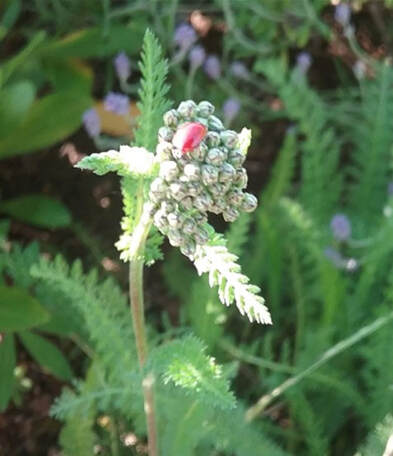
Erin lives near a park with dense growth in many areas and indeed there is jewelweed growing there and she is somewhat familiar with it. We call the Idaho woman back and let her know we can get some jewelweed and we are forwarded to her daughter whom we inform of the same possibility. The La Center woman thanks us profusely and will come by the next morning to pick it up in the meantime she is taking the son to get medical treatment. We don’t wild harvest many plants but because we are kind thoughtful herb ladies, we do harvest some jewelweed, store it in the fridge awaiting its use by the poison oak lad the following day. The next two days come and go with no call from the desperate mom in La Center. Not to let a good thing go to waste, we do what we had outlined for the woman and make some infusions. They are sitting on the counter in the certified kitchen infusing away to eventual go into bottles for anti-itch spray. This is definitely one of those times when you turn lemons into lemonade!
Jewelweed – Impatiens capensis is a widespread and common annual plant that occurs in moist, semi-shady areas throughout northern and eastern North America. You can easily find it throughout the west coast as well, as it has spread. Jewelweed also colonizes disturbed habitats such as ditches and road cuts and this where we found it on the side of a dead end road in a very shady area. It has orange flowers and is bush like, about 3-5 feet tall. The flowers form a seed pod which explodes or pops to release seeds when touched, hence its other name “Touch-Me-Not”.
Jewelweed contains a compound called lawsone in its leaves, which has been shown to have anti-histamine and anti-inflammatory properties. The leaves and the juice from the stem of Jewelweed have been used for centuries by Native Americans and herbalists as a treatment for poison ivy, poison oak and other plant induced rashes. (No doubt this is what the woman in our story found in her internet search and why she called us for help.) Even while in the woods, the leaves can be made into a poultice or the juice squeezed from the stem to help relieve itching. If the idea is to carry something in a readiness or first aid kit, then a spray or salve can be made ahead – its easy to make a simple infusion into vinegar, witch hazel or oil. Soaps with jewelweed can also be made or purchased to keep on hand for emergencies or preventative treatments. We made the jewelweed we collected into infusions which will eventually be made into sprays. The following web blog gives instructions on making a salve or spray:
https://hedgerowrose.com/the-still-room/2016/08/10/making-jewelweed-salve-and-anti-itch-spray/
Jewelweed is good by itself but we added a couple of other herbs to the infusions we made because we are familiar with them and know the benefits they provide. We chose plantain and yarrow since both are anti-inflammatory and soothing to the skin. They are also readily available on the farm and we don’t have to go somewhere else to wild harvest them.
Plantain – Plantago major is typically thought of as a lowly weed. It has an ancient traditional in both European, Oriental and Native American herbal medicine. It can be found throughout the United States growing along roadsides, in meadows, in cow pastures (that’s where we have a collection of rather large leafed plantain) and unfortunately, for many homeowners, in their lawns. There are two varieties but both have a rosette of ribbed leaves, either oval or pointed, with a seed stalk that resembles cattails. It grows low to the ground in single rosettes and has tough roots that do not pull easily from the ground.
Plantain is good for bites & stings, small wounds, and inflamed skin and a quick poultice can be made while in the garden or outdoors by chewing and crushing the leaves then applying to the skin.
Yarrow - Achillea millefolium, the perennial plant is also thought of as a weed. It has fern-like feathery leaves and a flower stalk that grows nearly four times the height of the leaves. The native plant has white flowers but there are other varieties with yellow or even pink flowers. Yarrow likes full sun and is considered drought tolerant and isn’t picky about the type of soil except if it is too wet. It is fairly low growing and will spread easily (like it has into our lawn!).
Since the times of Ancient Greece, yarrow has been used in poultices and ointments to treat wounds. It was used by soldiers during both world wars to help staunch bleeding. It has antimicrobial and pain relieving traits and is helpful for soothing skin irritations. It is also deeply nourishing and restorative.
Having some herbal remedies on hand could be a line of first defense for typical summer time rashes, itches, sunburns and irritated skin. In this time of uncertainty, seeking medical help is something each person must decide about based on the situation. We would never advise against that. Here’s to simple solutions and healthy herbal healing. Happy summer!
